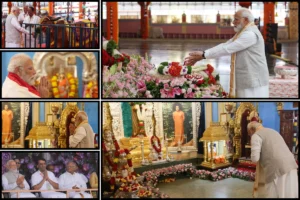
Chief Justice of India (CJI) D Y Chandrachud delivered a keynote address at the J20 summit hosted by the Brazilian Federal Supreme Court in Rio de Janeiro.
The summit, gathering Heads of Supreme Courts and Constitutional Courts of all G20 members, witnessed CJI Chandrachud’s remarks on the evolving perception of courts in India and the transformative impact of technology on judicial systems.
‘Indian Courts Reimagined As Democratic Spaces Of Discourse’
CJI Chandrachud highlighted the transition of Indian courts from authoritative empires to inclusive democratic spaces for dialogue.
He remarked, “We have come to reimagine our courts not as imposing ’empires’, but as democratic spaces of discourse.”
He noted that the COVID-19 pandemic accelerated changes in court systems, necessitating a shift from traditional, physically enclosed spaces to more accessible and transparent institutions.
In his address, CJI Chandrachud emphasized the role of judges as service providers accountable to the people.
CJI: As Judges, Neither Princes Nor Sovereigns
He stated, “As judges, we are neither princes nor sovereigns who are above the explainability requirement ourselves. We are service providers, and enablers of rights-affirming societies.”
CJI Chandrachud outlined technological adaptations undertaken by the Indian Supreme Court. He underscored the significance of virtual hearings, online streaming of court proceedings, and the e-Courts project.
CJI Chandrachud noted that virtual hearings democratized access to the Supreme Court. He added that it enables individuals with physical impairments, pregnant women, and the elderly to participate in court proceedings remotely.
Over 7,50,000 cases have been heard via video conferencing, with constitutional deliberations live-streamed on the court’s YouTube channel.
CJI Chandrachud highlighted India’s progress towards a paperless Supreme Court, with digitized and OCR-enabled paper-books.
He elaborated on the Case Management System built on Free and Open Source Software (FOSS), facilitating transparency and accessibility.
CJI highlighted the use of AI-enabled tools such as SUVAS for translating judgments into regional languages, enhancing accessibility to legal information.
CJI Chandrachud appreciated discussing the fusion of technology and judicial systems at the J20 summit. He highlighted the importance of collaborative efforts in shaping future justice delivery mechanisms.
The address by CJI Chandrachud encapsulated India’s commitment to judicial evolution and technological advancement. It reflects a broader global conversation on enhancing access to justice and fostering transparency in legal systems.
Also Read: Supreme Court Declares NewsClick Founder’s Arrest Illegal, Orders Release
To read more such news, download Bharat Express news apps





















